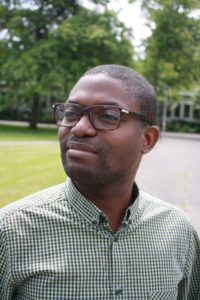In Our Footsteps is not like any other play you know. Director Taiwo Afolabi, who is also a PhD candidate in Applied Theatre at the University of Victoria, defines it as “interactive performance.”
“The idea of the play is really to communicate and recreate a safe and positive space to have conversations around lived experiences of immigrants,” says Afolabi.
Ten actors, many without a theatre background, have been preparing the play since January, working in a collaborative process.
“[The team] ranges from international students to settlers in Canada, Victoria, refugees, and immigrants,” says Afolabi. “Some of them are international students, some are domestic students from here in Victoria, and some of them are from the community, the bigger community in Victoria itself. Each person comes with expertise—we have musicians, dancers, [a] choreographer, actors, different expertises coming on board.”

Unlike repertory theatre, where actors and actresses perform a scripted play, interactive performance is based on stories of community members who decide collaboratively what to perform and how. Their everyday challenges, experiences, celebrations, and encounters with diversity, identity, language, and multiculturalism become the performance’s content.
“What the play does is really bring in these, and articulate themes in a very compelling and profound way, where the immigrants and actors involved are sharing their life experiences,” says Afolabi. “So, the play is really about engaging and having interactions on issues that are of importance to immigrants and refugees. [There is] an interactive session where we are going to be doing a sort of workshop to make space to really unpack those themes. The play is an opportunity to really engage in those serious conversations in a very safe and non-threatening way.”
In In Our Footsteps, the audience members transform into participants and can engage with the issues the play examines by bringing their questions, comments, and own experiences. The director’s role is to facilitate the production process.
“I see myself as building bridges and working over different gaps,” says Afolabi. “Filling different gaps.”
Afolabi studied theatre over 10 years ago at the University of Jos in Nigeria. He’s the founder of Theatre Emissary International, a theatre organization that engages with communities to address social issues. He’s used community-engaged theatre in several contexts and countries—China, Nigeria, Iran, and Canada, to name just a few—to address issues such as health, diversity, development goals, and sustainability.
“Many people are trying to see how theatre can give us an opportunity to break walls and really have a definition and understand that it comes from the people, and how that threat will become an opportunity to really make rules and policies in a way that will be people-driven rather than [a] top-down approach,” he says.
The seeds of this year’s performance were sown last year when Afolabi brainstormed with urban and cultural planner Jasmindra Jawanda on how to engage with refugees in a meaningful way. Their collaboration culminated in performances around town, including one at Victoria City Hall.
“We wanted to really articulate issues coming from them rather than enforced on them,” says Afolabi. “That was the beginning of this project we did last year; it was very successful.”
Although In Our Footsteps is not conventional theatre with professional actors, Afolabi says that won’t get in the way of anyone’s enjoyment.
“It is highly professional and will be aesthetically pleasing to the participants,” he says, “because that cannot be compromised.”
In Our Footsteps
Various times, Tuesday, June 19 to Thursday, June 21
Free, various venues
Search “oniontheatre” on Facebook
